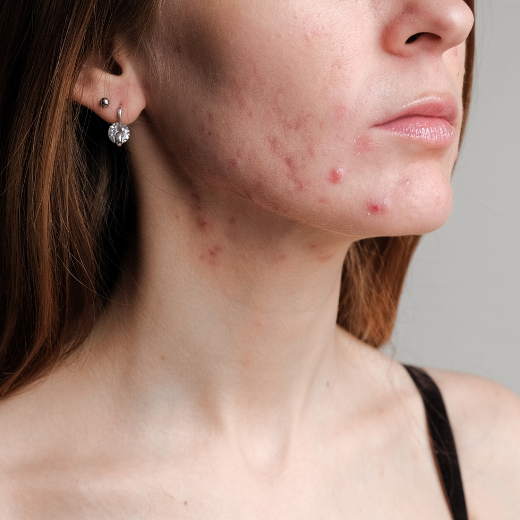Stopping Birth Control? Here's How To Manage Post-Pill Acne
Posted by Ellie Swain on Nov 11th 2022
Whether you’ve already stopped taking birth control, otherwise known as ‘the pill,’ or are considering doing so, you’ll want to work with your healthcare provider to ensure this is the best choice. You’ll need to make sure you’re well aware of any potential side effects.
Unfortunately, some of these potential side effects may affect your skin. Have you ever heard of ‘post-pill acne’?
The pill is known to suppress acne, as it decreases the production of sebum-producing hormones. But when you stop taking the drug, your body gets used to producing its own hormones again, sometimes contributing to acne.
But don’t worry. You’re not doomed to unwanted breakouts for the rest of your life once you stop taking the pill. There are plenty of ways to manage post-pill acne.
Keep reading to learn more.
Why does acne flare after stopping the pill?
First, let’s better understand post-pill acne and why it occurs.
As we mentioned, certain hormonal contraceptives like the pill reduce sebum production. This is the natural oil the skin produces, keeping our complexions protected and hydrated.
But too much of it can contribute to the dreaded acne. Once you quit the pill, your skin responds by increasing sebum production and thus resulting in oily skin and more breakouts.
That’s not just it. The pill affects our body’s capabilities to produce its own natural hormones.
One way it keeps acne at bay is by reducing androgen levels, like testosterone, circulating in the blood.
When you give up birth control, your ovaries try to return hormone levels to normal, which may lead to an androgen rebound.
Likewise, with higher levels of androgens, we get a sebum increase causing oily skin and breakouts.
Another cause of post-pill acne is zinc depletion. The pill depletes many essential nutrients, including zinc, which is vital for healthy skin and is a popular treatment for breakouts.
Zinc reduces bacteria lingering on the skin that can contribute to breakouts. A zinc deficiency caused by long-term pill use may contribute to post-pill acne.
How do you treat acne after quitting the birth control pill?
Thankfully, there are various ways to support your skin when you stop using the pill.
Ditch the dairy
We know, we know. Your daily cappuccino in the morning is a must to keep you awake and focused for the day.
But consuming dairy, especially from conventionally raised cows, is linked with acne. Dairy is teeming with hormones and inflammatory proteins that can promote or worsen acne.
Once you stop taking the pill, dairy isn’t doing your any favors on your path to clear skin.
Luckily, there is plenty of delicious dairy-free milk to stir into your morning coffee, like oat, almond, and soya. Plus, with the rise of veganism, some delicious vegan cheeses are available in the market, too.
Supplement with zinc
As mentioned, zinc works great as an acne treatment, especially post-pill, as zinc deficiency is common in birth control pill takers.
Zinc helps to regulate testosterone, kills acne-causing bacteria on the skin, and reduces keratin that blocks pores.
Consider speaking with your doctor regarding what dose of zinc is best for you.
Use the right products
Sometimes our skin needs a little extra help to banish the dreaded breakouts. Choosing the right acne-treating products can sometimes be essential to get rid of acne for good.
The TuelLets Be Clear Here Gel is a powerful daily wash that purifies the skin and treats acne. Brimming with natural astringents such as cajeput, witch hazel, and rosemary, the wash helps to reduce breakouts and prevent future blemishes.
Another excellent acne treatment is the PCA Skin AcneCream. Containing benzoyl peroxide, the cream targets and treats stubborn breakouts while simultaneously preventing new ones.
Fast-acting benzoyl peroxide clears acne breakouts, while polyhydroxy acid gluconolactone maintains breakout control and soothes the complexion. Meanwhile, active botanicals help reduce any irritation.
Balance your blood sugar
The pill has adverse effects on blood sugar regulation and insulin production. When our blood sugar levels are unbalanced, we get high insulin levels, and our body creates higher levels of androgens. This can result in acne.
Remember that high levels of androgens like testosterone can lead to higher sebum levels in the skin, contributing to more breakouts.
Keep your blood sugar levels steady and healthy by eating plenty of fresh foods. Every meal you tuck into should include plenty of nutrient-dense veggies, high-quality protein, and healthy fats.
If you can, wave goodbye to as much white flour, sugar, and alcohol as you can. At the very least, keep these foods to a minimum.
Getting enough exercise is also essential. Exercising increases insulin sensitivity and helps manage blood sugar.
Do you want more advice on banishing acne? Read up on the surprising ways you can get acne here .

